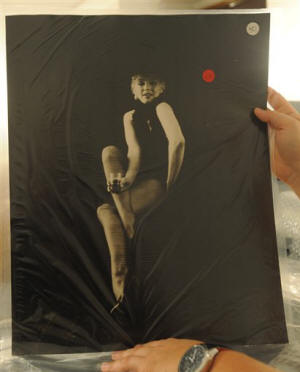 |
|

 Marilyn Monroe photos on auction in Poland
Marilyn Monroe photos on auction in Poland
[November 09, 2012]
WARSAW, Poland (AP)
--
|
Bidders and spectators packed the Desa Unicum house in Warsaw, where 238 pictures by the late American fashion and celebrity photographer Milton H. Greene were up for sale. Only one remained unsold, among some 500 bidders. The auction house said in a statement that the 2.4 million zlotys obtained made it the nation's biggest photo auction to date. Most of these pictures of Monroe were taken from 1953 to 1957 when Greene was her advisor and business partner. He made many of the prints during Monroe's lifetime and they are highly valued by collectors. They include series of refined black-and-white studio photos and shots taken in natural surroundings, sometime in provocative poses, some in color. As the bidding began, a black-and-white photo of a reclining Monroe in black stockings sold for 50,000 zlotys ($16,000), and another of her in a ballerina's dress sold for almost $20,000. A picture of her in bed sold for $8,500. The auction also offered Greene's pictures of other stars, like Audrey Hepburn, Grace Kelly, Marlene Dietrich and Liza Minnelli. A picture of Nelly Nyad in white veil was among the bestsellers, at some $14,000, the auction house said. Other greats in the vast portrait collection, which had been estimated at $680,000, included Cary Grant, Frank Sinatra, Paul Newman, Alfred Hitchcock and Marlon Brando. The photos come from a collection of some 4,000 Greene pictures that Poland obtained from Chicago businessman Dino Matingas in the mid-1990s as the result of a complex communist-era embezzlement scandal linked to the buy-out of Poland's state debt. Proceeds from the auction will go to the Polish government. Some of the images have never been published before, according to Marta Maciazek, the Polish official in charge of cleaning up the mess from the corruption affair. Many bidders were disappointed to be left empty handed after starting prices of just 500 zlotys ($120) skyrocketed. "I'm very disappointed, I was hoping to buy a picture for myself because she is gorgeous, but it just went far beyond my possibilities. Pity," said Jerzy Derczyk. |


